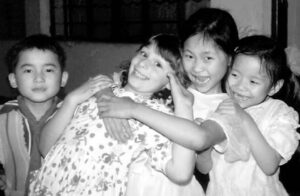EDITED BY LUCY KOSTELANETZ
DISTRIBUTED BY THE MEDIA GUILD
11722 SORRENTO VALLEY ROAD SUITE E
SAN DIEGO, CA 92121-1021
1992. 28 MINUTES
Reviewed by Diane Carson
In August 1988, when her parents move to the foreign visitors’ guest house at Zhongshan University to teach English to Chinese students, seven-year-old Rebeka accompanies them. Thus begins a ten-month adventure that few children could envision, a thorough immersion in Chinese culture including learning to read, write and speak some Mandarin. In June 1990, a year after her return to New York, Rebeka, answering questions from an off-screen narrator, reflects on her experiences and provides an illuminating context for integrated video footage and still photographs. Through recollections presented in roughly chronological order, Rebeka describes her initial difficulties in an all-Chinese school on the Zhongshan University campus, the strict classroom environment she encountered, her ease in making friends, the games she and her friends played, and the celebrations they enjoyed; that is, the many details of her daily life, all presented in accessible language with illustrative pictures.
Rebeka begins by acknowledging misimpressions of China that she held before her trip, such as believing needles would be stuck in her fingers for punishment. She then happily reports that reality contrasted dramatically with, and nullified, her fears. I suspect many of us who have visited China would echo that viewpoint (I would) and acknowledge the numerous misconceptions to which too many, perhaps unquestioningly, still subscribe. Significantly, then, Rebeka Goes to China offers first-hand observations that will help dispel some erroneous, contemporary ideas, ideas too seldom challenged. For students, it will open the topic of China to nonthreatening discussion given Rebeka’s frank acknowledgment of her own wrong-headed beliefs. Equally important, Rebeka provides the particulars of a China we seldom see, that of young children as they learn and play. Through a vast array of topics and her clearly enjoyable experiences, Rebeka encourages discovery of another culture.

Because of Rebeka’s age and the video’s low-key approach (we’re never bombarded with statistics or academic lectures), Rebeka Goes to China will find in elementary and junior high school classes its best audience. To that end, producer/director/ editor Lucy Kostelanetz keeps the focus on Rebeka and her friends. We never see her parents except in photos, nor should we. Rebeka’s opinions and thoughts provide a refreshingly casual glimpse of China as she talks about routine topics: food, language, schoolwork, and play. On mastering the language, she explains that it took about four months to learn some Mandarin and six months to feel comfortable with it. But we see Rebeka having a good time with a girlfriend despite their language barrier. In another scene, Rebeka explains her Chinese name, and she talks about mischievous students pronouncing the word for their teacher so that it sounds like they’re calling her “rat.” Rebeka’s Chinese classmates alternately show off for, or act embarrassed before, the camera. They play hopscotch, jump rope, and Rebeka teaches them musical chairs. They do exercises before going into class, and two girls sing “Happy Birthday” to Rebeka for her eighth birthday, first in English and then in Mandarin. In short, we watch Rebeka and her friends as energetic children of high spirits and good humor meeting across cultures.
Video footage juxtaposed at appropriate points throughout Rebeka provides additional, illuminating information: candid street scenes with the ever-present bicyclists, a man repairing shoes while his customer waits, men gambling, various marketplace activities, an apartment house with clothes hung out, and so on. Ideally, I would have liked Rebeka’s on-camera time shortened with her voice-over narration complemented by more unrehearsed, revealing scenes. For a young audience, there is too large a proportion of Rebeka just talking to the camera. Late in the program, politics becomes a topic, with Rebeka explaining her decision to become a young pioneer; that is, a member of the Communist party. Soon, however, the Party presence becomes a disruptive one. After Tiananmen Square, Rebeka’s family is abruptly asked to, and must, leave.
Though never exactly thrilling to watch, Rebeka has a likable, low key manner as well as, at times, the unselfconscious, spontaneous silliness of the title character. Taking us along into formal and informal class exchanges, into courtyards and homes, and into the street, the viewer becomes a young student, too, learning about China as Rebeka does. What may surprise us most is the pleasure with which Rebeka engages her classmates and the genuine, uninhibited acceptance of Rebeka by them. In video footage of her friends shot after Rebeka has left for America, several apologize for not showing more gratitude to her and ask for forgiveness for not acceding to her requests for keepsakes when Rebeka had to leave. Their teacher’s prompt, “She’s our American friend. Don’t say anything bad,” is quite revealing, but the children’s warm-hearted responsiveness shines through nonetheless.
This video would best complement an entire unit on China, paired with some show-and-tell on food (which Rebeka says she really liked despite reservations about the Chinese eating dogs and cats and “any old bird”). Comparisons and contrasts between the Chinese and American schools, especially the strict code of conduct or the lack thereof, would easily involve students in listing similarities and differences. Transportation (bicycles versus cars), exercising, parties—all suggest numerous topics for discussion, supplemented by more pictures and videos as well as first-hand experience. Inclusion of any student’s exposure or knowledge of non-American cultures would enrich the unit further. Finally, Rebeka observes that in one big world, “you think everything’s the same wherever you live, but it’s really not true.” Rebeka Goes to China proves this and encourages students to see that, as Rebeka also notes, “China’s really different” but learning about it is “like finding a treasure.”
[Rebeka Goes to China won a Bronze Apple Award at the National Educational Film & Video Festival.]

